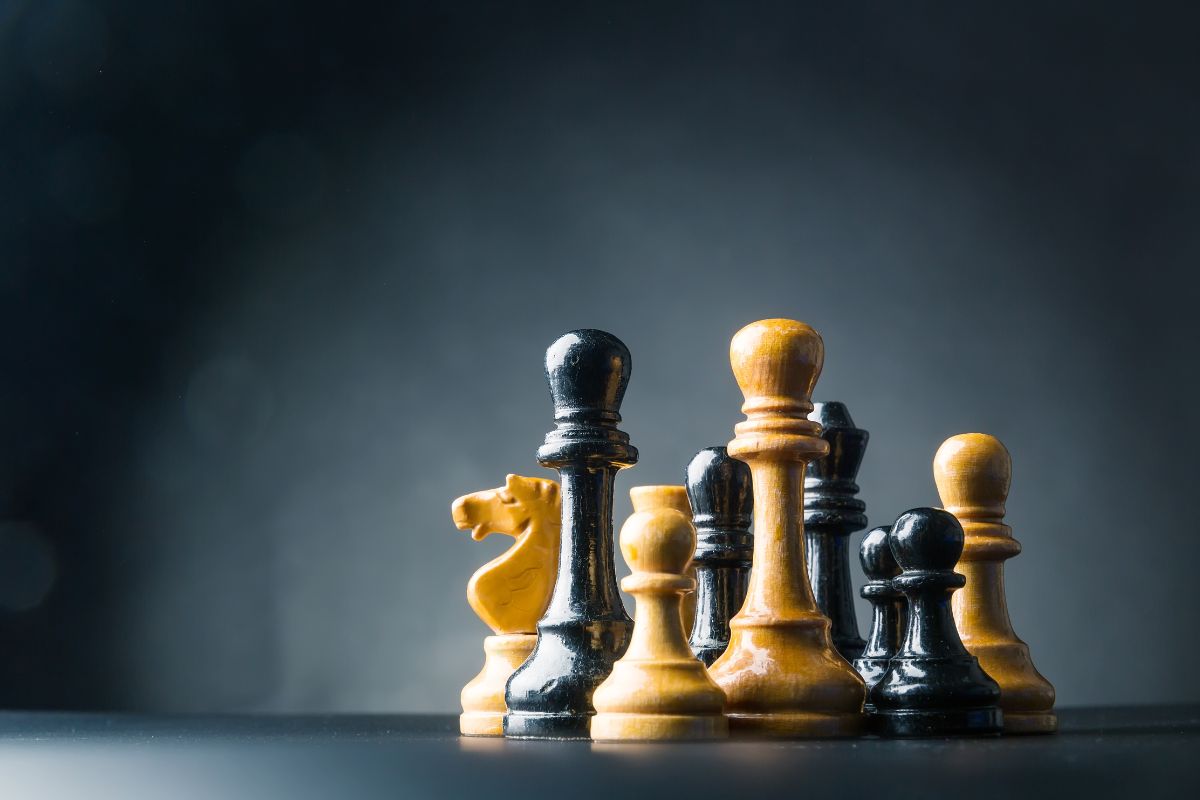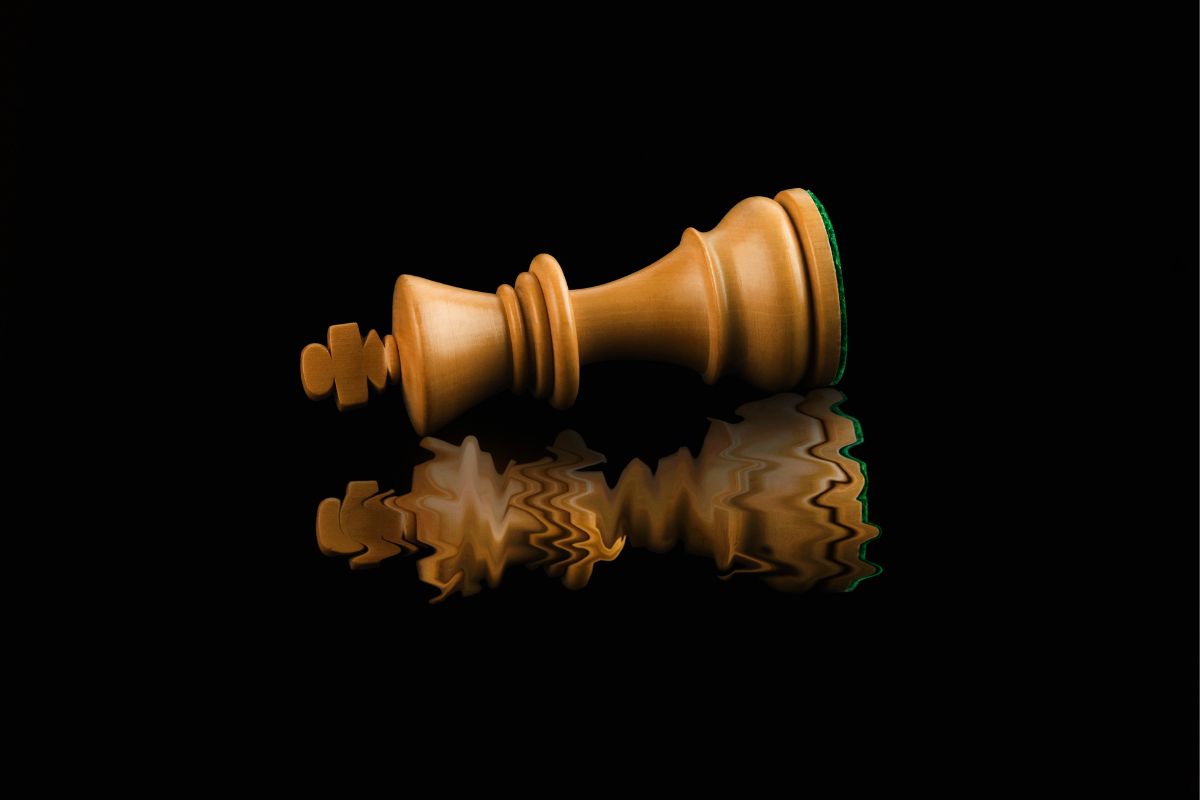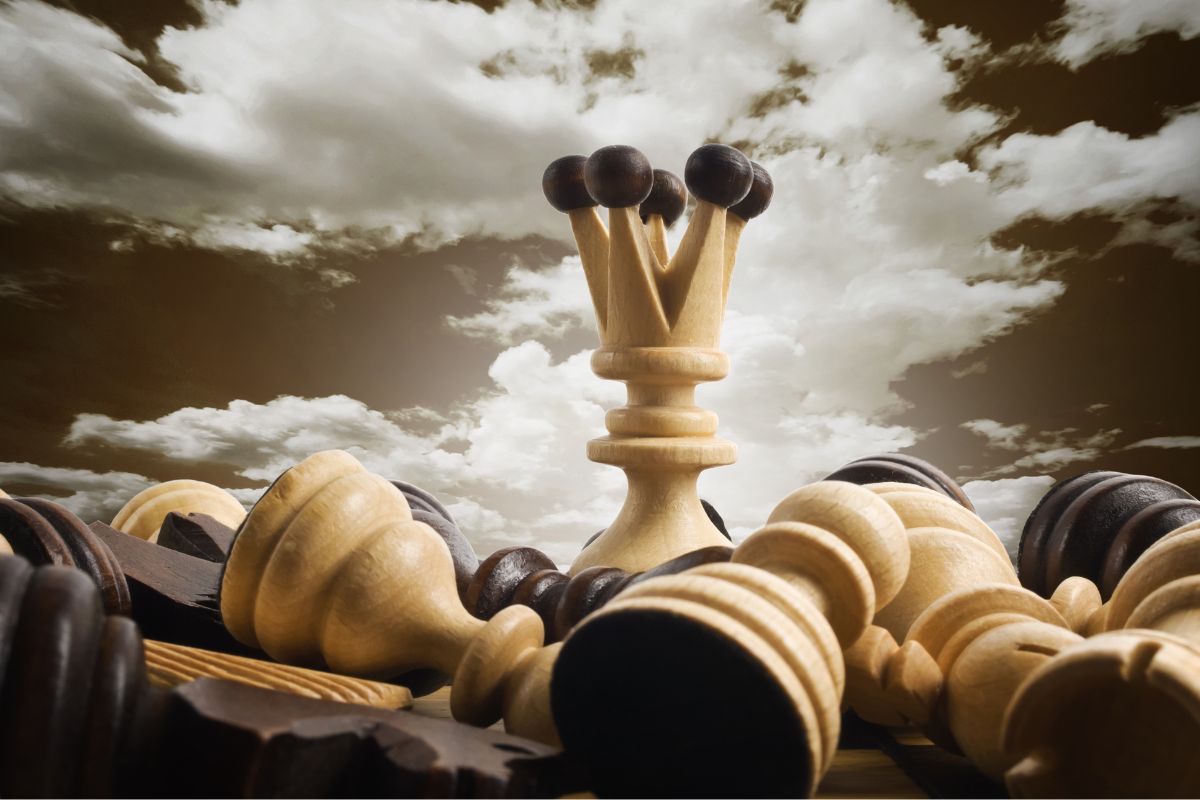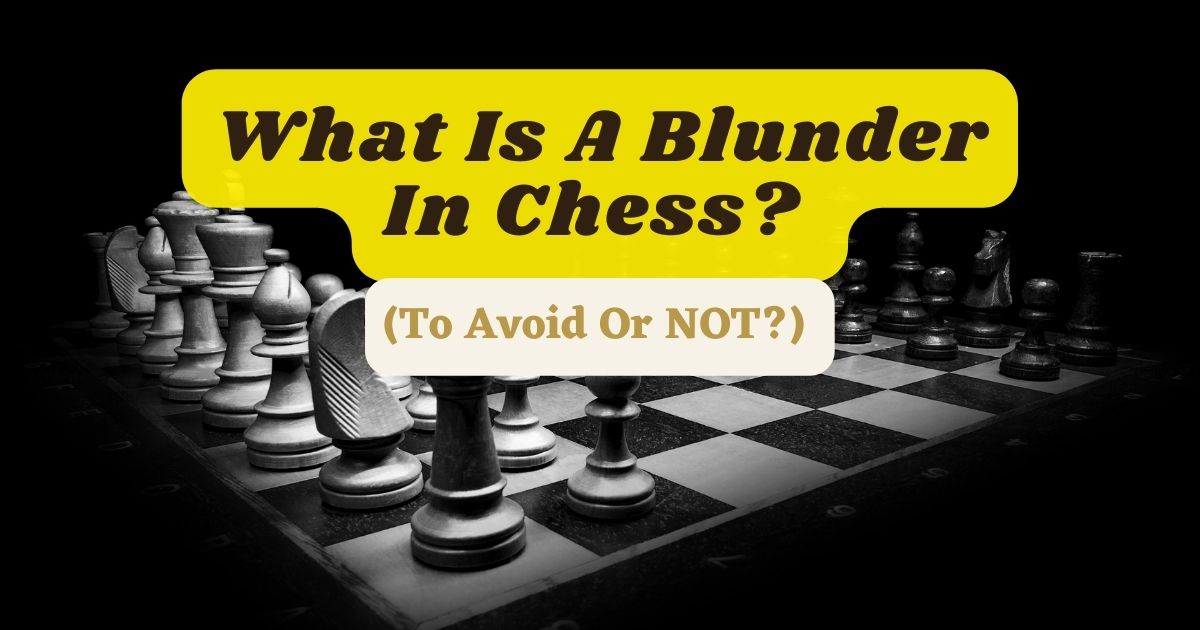What is a Blunder in Chess?
What is a blunder in chess? Most people get confused about mistakes and blunders in chess. In chess, a blunder is when a player makes a severe error. Such mistakes can quickly ruin a game by putting the winning player in a draw or even behind.
Making a mistake is normal in chess. Even grandmasters make simple mistakes. However, blunders give opponents a great advantage. It would help if you avoided blunders at all costs.

The Importance of Chess Blunders
The game of chess may be brutal. One blunder in chess can turn a game around even if you play with perfection and dominate your competitor.
Avoiding blunders is crucial to winning more chess games and is the key difference between beginners and chess masters. But regrettably, nobody is blunder-proof. Even experienced chess players make fatal blunders from time to time if a player makes a bad blunder.
One Example of a Chess Blunder
Let’s face it: Everyone enjoys watching a top chess player blunder. Even professional chess players have had their “off-days” where a blunder cost them the match. A blunder is a move that could cost you everything. A blunder can ruin a position that you have worked on for hours. Serious blunders will make you swear you will never play chess again.
An example of a blunder made by chess master Gata Kamsky was when playing with GM Alexei Shirov. Alexei Shirov moved his queen to position Qc5 and proposed an exchange.
Kamsky did not want to trade queens, so he moved his lady back to position b3. However, he failed to notice that his knight was left unprotected, which was a big blunder. Shirov captured his queen, forcing him to resign right away.
How to Avoid Blunders in Chess Games
Now that you know what a chess blunder is, let’s talk about how to avoid blunders in chess. Anyone can make a blunder, from amateur chess players to experienced chess masters. That is why you need to know how to avoid blunders in chess.
However, we are human, and it is natural to make mistakes on the chessboard. Here are a few tips on how to minimize blunders when playing chess.
Never Leave Any Piece Undefended
It would help if you always guarded your pieces against any attack from the enemy. Leaving your pieces unprotected is the easiest way to blunder.
Warm Up Before the Game
Before starting a chess match, it is advisable to do a quick “warm-up.” You can do this by solving chess puzzles or playing speed chess. Such warm-ups prepare your brain for the task and get you in the mood for the game.
Other warm-up exercises include solving tactical problems. Try and solve between 10-12 simple problems within 5-10 seconds each. These warm-ups will lower your anxiety and keep you focused on the game.
Remain Calm
Anxiety is the most common reason why chess players blunder. The best chess players are always relaxed because they can think creatively about the position. Professional chess players say if you are relaxed and composed, you have already won half the match.
With a calm mind, you can work out your game plan and analyze your competitors’ next move, whether you’re winning or you must always stay calm. Whenever you feel tense, just take a deep breath.
Look Before You Leap
To avoid blunders in chess, you must always check for any potential dangers before making a move. Therefore, you must critically evaluate the outcome of each move before you leap.
After you have decided on the move you want to take, visualize it on the chess board. Moving too quickly without checking will cost you the game.
You must check to see if your competitor has any forcing moves or immediate resources. Consider all possible captures, checks, and attacks against your pieces. This final glance should keep you from missing any hanging pieces.
Be Time Conscious
It’s best to always keep an eye on the clock when playing chess. Time trouble is one of the most common causes of chess blunders. That’s because most players panic when they see that their time is almost over.
To avoid getting yourself in such situations, always watch the clock when playing. Here are two useful practices for when you’re already in the tournament.
Consider taking a 10-minute walk right before the tournament. That will help you to relax and clear your head. The walk should not be long enough to tire you out just for you to get some fresh air. It is advisable also occasionally to leave your seat and stretch during the game.
You must eat during your long tournament days or before any game because an empty stomach can be quite distracting. Your mind and body need energy and nourishment during the match.
Look For “The Threat” Behind Your Competitors’ Moves
There is always an idea behind each move a chess player makes. As soon as your competitor makes a move, try to understand why they made that move. This way, you will identify any possible threats created by the last move which you otherwise may not have noticed.
Ensure you do this each time your opponent makes a move. At the end of the game, you will notice that you missed very few of your opponent’s tactics.
Write Down Your Chess Moves
Writing down your chess moves will enable you to learn from the wrong moves and replay the good moves! On days when you play a superb game of chess, you can share the moves with your other friends.
Writing your moves will also enable you to analyze how you could make better moves in the future or learn from a lost game. If you have an instructor, they will be able to give feedback based on your recording sheet.
Put in Perspective
One of the most important things you should remember when playing chess is that, in the end, it’s just a game! It’s never that serious. Having fun while playing will help you make better moves. Remember, it’s possible to be serious and have fun simultaneously. It’s much better than being serious and having no fun.

What is a Mistake in Chess?
A mistake in chess is when a player makes a bad move. Chess annotation mistakes get denoted by one question mark after the move (“?”). Chess annotations are symbols chess commentators use when explaining the game to readers.
Unlike a blunder, which can change the result of the whole game, a mistake will only change the ranking of a position. Making a mistake when playing chess will disadvantage you or make you lose a good opportunity.
The most common cause of mistakes in chess is failing to understand your position. Stakes are more strategic than tactical and will mostly cost you material or tempo.
One Example of a Chess Mistake
The one common thing among all chess players is that they always want to be better players, from new players who have just learned to move the pieces to professional chess players. The good news is there is always a chance to do better than before.
However, it takes effort because mistakes are always there, hanging around the player’s hand, waiting to be made. However, mistakes are less severe than blinders in chess. Some mistakes will cost you the game instantly. One of the most typical mistakes new chess players make is playing too many moves with the pawns.
In the opening, it’s advisable to play a few moves with the pawns. It would be best if you used the pawns mainly to control and occupy the center of the board. Like in soccer, your main aim when playing chess should be to maintain the center of the board.
Most new chess players make the mistake of most of the moves with the pawns, which makes the king exposed in the center for a long time. Making too many moves with the pawns also delays the development of the knights and bishops. You have to be very strategic when moving the pawns.
How to Avoid Mistakes In Chess
Most chess players naturally tend to focus on their ideas. However, being a game between two players, you must consider your opponent’s ideas equally.
The most common way to avoid mistakes in chess is to identify your opponent’s threats and evaluate the consequences of your proposed move before taking it. Here are five more things you can do to avoid mistakes when playing chess.
Try to Analyze Your Own Mistakes
It’s advisable to review the games you played, especially the games you lost. Identify the mistakes and ask yourself, “Why did I make this mistake?”. Developing an understanding of why you made that mistake will sensitize your mind to the mistake you made. This understanding will help you avoid making similar mistakes in future games.
Work on Your Tactical Skill
Inadequate knowledge of motifs and tactical patterns makes it hard to calculate variations effectively. You are also likely to have oversight if your tactical skills are not good enough. You can improve your tactical skills by studying the various motifs in chess tactic puzzles.
Puzzles will increase your pattern awareness, and you will be able to quickly identify mistakes when playing chess.
Practice a Disciplined Calculation Process
A good calculation process is the first defense against making mistakes in chess. You must always identify and calculate your opponent’s ideas and threats. To keep your chess brain sharp, you must practice many calculation exercises. The best way to improve your calculation is by studying as many chess games as possible.
Improve Your Visualization Skill
Being able to clearly visualize the consequences of your intended moves before you move the piece is one of the most important skills that will help you avoid mistakes.
Improve Your Concentration
You will likely make many mistakes while playing chess when you are mentally tired. Challenging yourself with tricky chess puzzles will increase your ability to concentrate for longer periods.
The Difference Between Blunders and Mistakes in Chess
Here are some of the differences between mistakes and blunders in chess.
Chess commentators use a single question mark “?” to denote a mistake but a double question mark to represent a blunder “??”. These question marks allow players to go over their moves and know when they made a mistake. Chess notations describe a player’s moves, the piece, and the square to which it is moved.
Mistakes are bad moves that could result in the loss of material or worsen your position as a player. Blunders, on the other hand, are very bad mistakes. Such mistakes could easily lead to a loss or draw in a game you were winning.
Another common difference between mistakes and blunders is that mistakes are weak moves mostly made by new chess players. Blunders, however, are the same weak moves played by professional chess players.
Another difference between mistakes and blunders in chess is that mistakes tend to be positional concessions. Blunders are a significant loss of position, material, or both.

Summary
We hope that now you understand the difference between mistakes and blunders in chess. We have also covered how to identify mistakes and blunders in chess. With this knowledge, we are sure that you will be able to avoid making these errors in your future games.
Analyzing your games is one of the easiest ways to reduce blunders and mistakes. Identify your bad moves in the previous games, and learn from your mistakes. But how can you know where you went wrong? After all, you played the move because you thought it was great. You may consult someone better than you or your trainer if you have one.
Websites like Chess.com will inform the players how many blunders and mistakes they made after a match. This information allows them to understand better which mistakes are more dreadful and how to avoid them in the future.
As you practice becoming a better chess player, remember that blunders and mistakes are part of learning chess. Even the best chess players in the globe make their fair share of blunders. However, learning from your mistakes is essential for improving.

